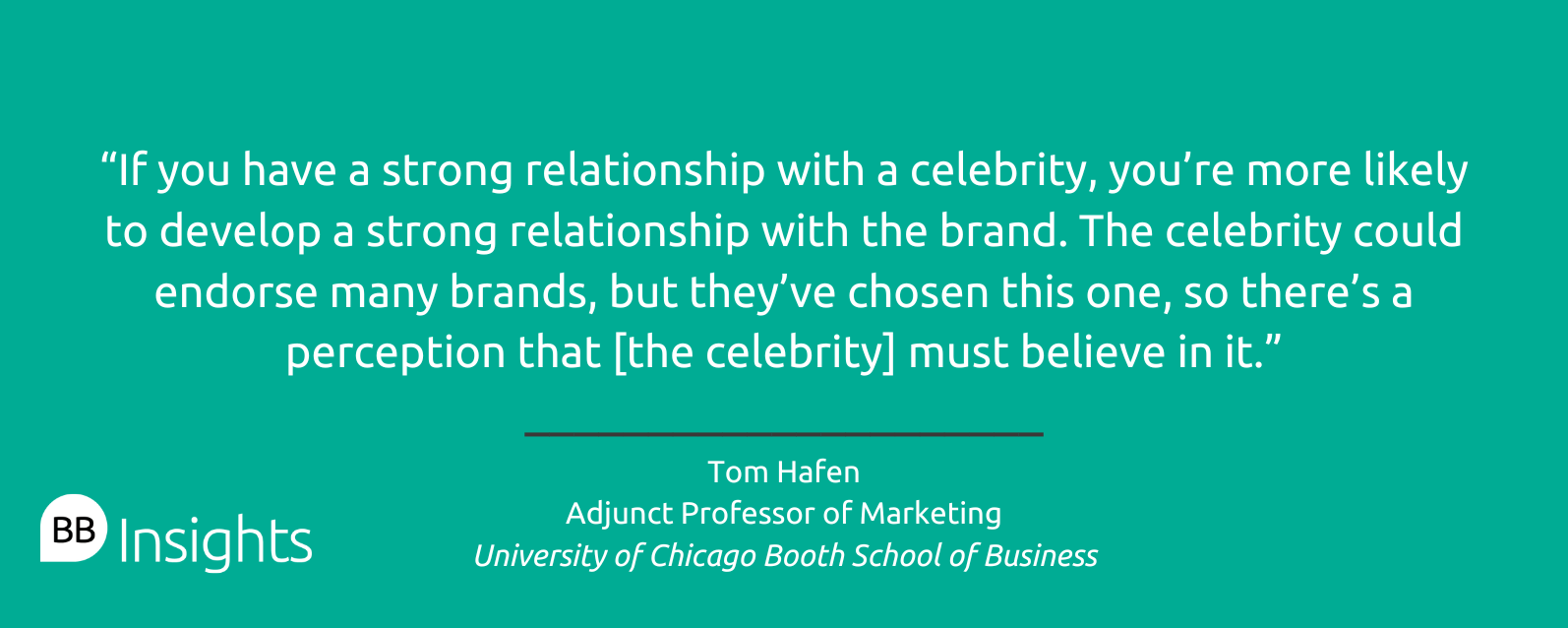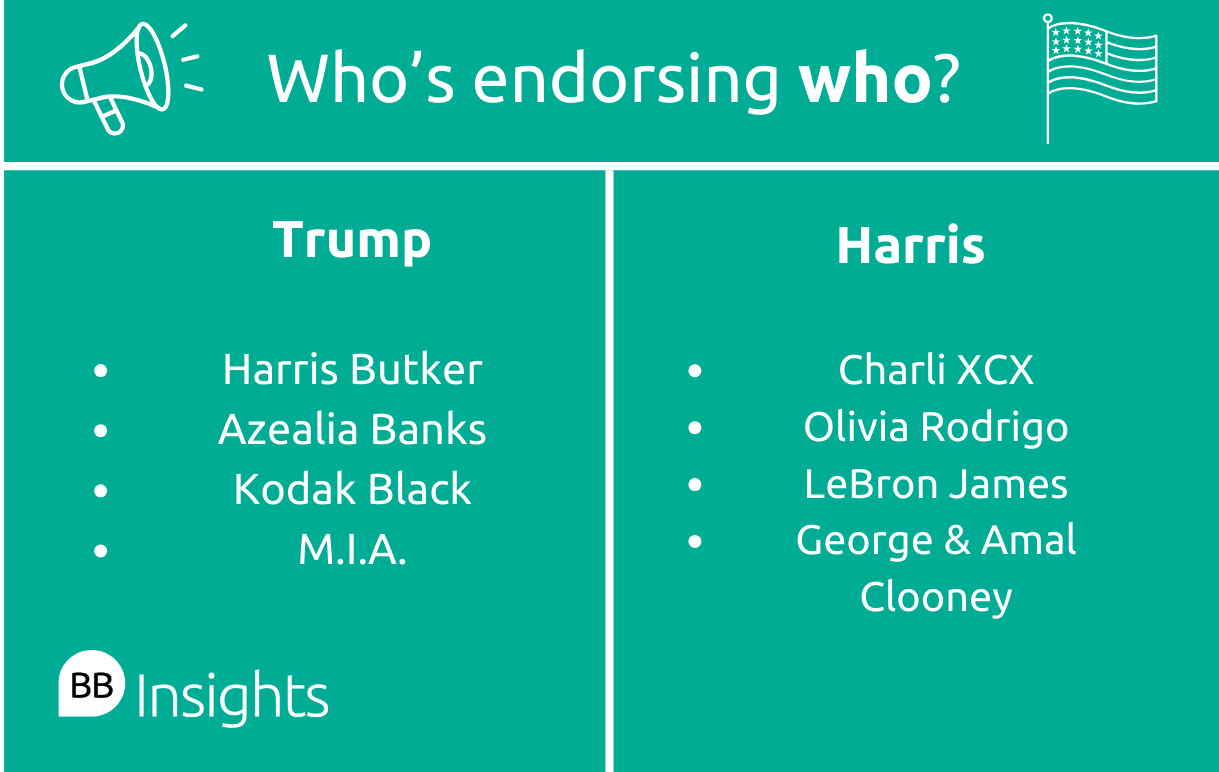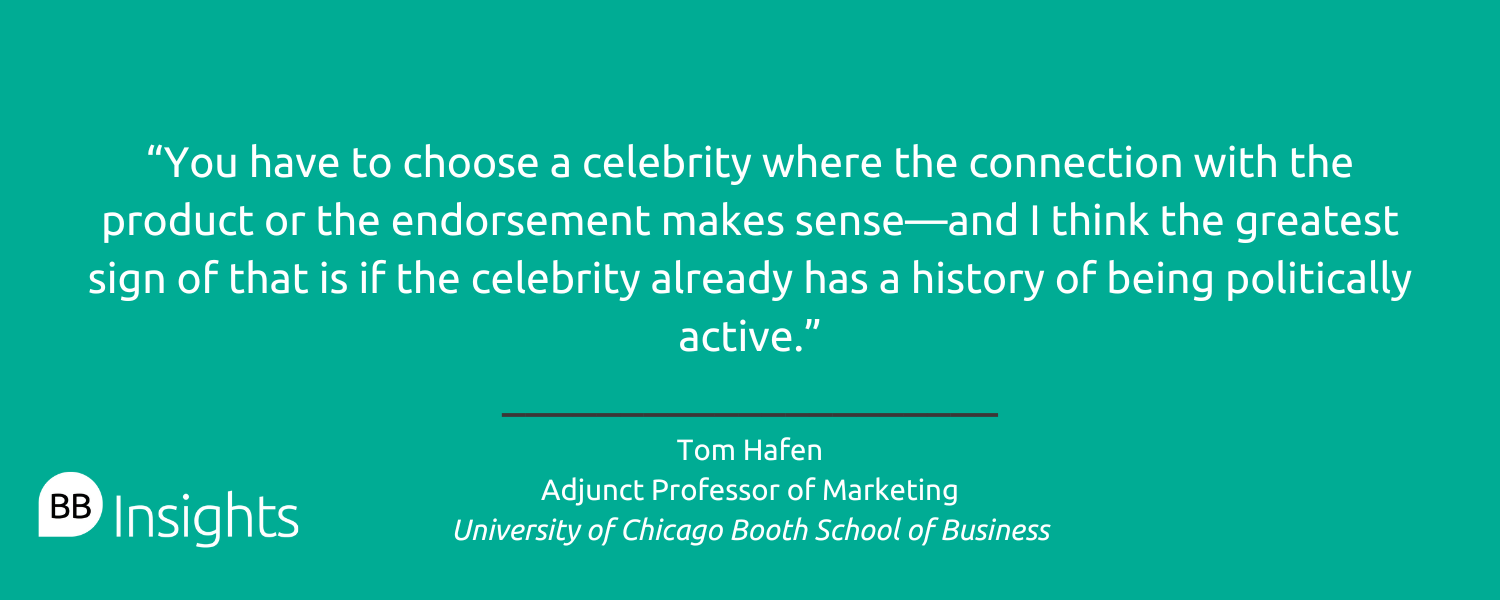British pop singer Charli XCX defines a brat as a "messy party girl" with "a pack of cigs, a Bic lighter, and a strappy white top"—symbols of hedonism that seem worlds apart from the image of vice president Kamala Harris. So, why did the singer of the ‘Brat’ album use this term to endorse Harris on social media?
It’s likely that the three-word statement ("Kamala IS brat") was not meant to be taken literally. Instead, it was a way for Charli to express her admiration for the Democratic candidate, using the vernacular that she made popular and that resonates with her fanbase. The endorsement set tongues wagging across the world: Had the ‘Brat’ singer—and Harris' PR team—just won over young Gen Z voters at a critical moment?
That’s certainly what Harris’ team might have thought as they quickly emblazoned the Democrat candidate's X (formerly Twitter) page with the infamous ‘Brat’ neon green branding.
Celebrity endorsements in politics aren’t new—so what makes them effective? We spoke to a marketing expert from the University of Chicago Booth School of Business to find out.
Celebrities endorsing Kamala Harris: What makes an endorsement effective?
Despite being one of the most famous examples—sparking debates worldwide about the true meaning of ‘brat girl summer’—Charli XCX isn’t the only celebrity endorsing Kamala Harris.
US pop star Olivia Rodrigo is no stranger to rubbing shoulders with politicians, having supported President Joe Biden during a Covid vaccine uptake campaign at the White House in 2021. Most recently, she endorsed Kamala Harris in true Gen Z fashion by sharing a clip from Harris’ first campaign rally on Instagram. Similarly, Taylor Swift took up the pop-to-politics baton, endorsing Harris in a playful Instagram post signed ‘Childless Cat Lady’.
Tom Hafen, adjunct professor of marketing at the Chicago Booth School of Business and head of marketing strategy at GEICO, explains that several factors can make a celebrity endorsement successful.
He says there needs to be an organic alignment between the celebrity and the audience, alongside an appropriate level of celebrity presence. In terms of brand presence, Tom explains that maintaining a good balance between the celebrity and brand power is crucial.
A celebrity or public figure could overshadow the campaign or product, although this is less likely in the context of a US presidential election.
“The two most important things in branding are awareness and consideration. You want people to go from having never heard of that brand to absolutely knowing about it,” explains Tom, who previously led consumer communications for Goldman Sachs.
Whether Charli XCX’s endorsement of Harris via the ‘Brat’ label was orchestrated by Harris’ PR team or not, it may have helped Harris reach a much younger demographic of potential voters.
There are 41 million eligible Gen Z voters in this election cycle, according to Tuffs University. However, young voters are notoriously unreliable, with only 53% of 18–29-year-olds stating that they are definitely going to vote in the election, according to Harvard data.
“A celebrity offers a connection with the product, and that connection can lead to trust and consideration on the audience’s part,” says Tom.
“A strong relationship with the celebrity can result in a strong relationship with the product,” he adds.
Charli XCX’s endorsement of a hedonistic lifestyle through her Brat album and her overall party-girl image resonates with a Gen Z audience. Associating the vice president with someone younger voters admire, may help Harris seem relatable.
“[Harris] is leveraging the audience’s affinity for the celebrity and trying to get it to rub off on her.
“If you have a strong relationship with a celebrity, you’re more likely to develop a strong relationship with the brand. The celebrity could endorse many brands, but they’ve chosen this one, so there’s a perception that [the celebrity] must believe in it.”
Donald Trump has his own trailing of famous backers. In 2018, rapper Kanye West famously endorsed Trump’s MAGA (Make America Great Again) campaign. Azealia Banks, M.I.A., and Kodak Black, and Kansas City Chiefs’ kicker Harrison Butker are among Trump’s other alleged celebrity supporters.
More recently, however, one of his most powerful and influential backers has been revealed as Tesla CEO, Elon Musk. The America PAC, a pro-Trump group that’s allegedly funded by the SpaceX billionaire, even offered to pay $47 to swing state voters who signed a petition “to show support for free speech and the right to bear arms”—a move that’s proved highly controversial.
Celebrity endorsement examples: Can any celebrity endorsement work?
There are numerous examples of celebrity endorsements both within and outside of politics. Yet, it seems to be the endorsements in politics that are most likely to create a media frenzy or draw significant attention to a particular candidate—perhaps due to the stark blending of worlds.
“You have to choose a celebrity where the connection with the product or the endorsement makes sense—and I think the greatest sign of that is if the celebrity already has a history of being politically active,” says Tom.
George Clooney, who, along with his wife and human rights lawyer Amal Clooney, is vocal about politics, and LeBron James are among the celebrities endorsing Kamala Harris, having previously supported Joe Biden.
“These figures are often seen as inherently connected to the world of politics.
“Someone who has no presence in the political arena and then comes out and endorses someone might seem a little odd, so you must ensure it’s someone with credibility in the space,” he explains.
This doesn’t mean that those celebrities must have a direct history in politics, but that they have an affinity for broader political causes, such as climate change.
Celebrity endorsement ads vs endorsements in politics
A celebrity endorsing a new skincare range, for example, versus endorsing a political candidate might seem like two completely unrelated endorsements, but the underlying principles are quite similar.
“What these endorsements are trying to do is articulate the benefit of the product,” says Tom.
However, he points out a key difference: it’s much harder to articulate the direct benefits of a political candidate compared to a physical product.
Despite their stark differences, both Harris and Trump are aiming for the same outcome—convincing voters by highlighting the benefits of their presidency, whether that’s healthcare, the economy, education, or the overall direction of the country.
This is similar to the way a product is marketed by emphasizing its benefits to the audience.
“The window in which the audience will see the benefit is four to eight years in a presidential cycle versus 30 days for a consumer product. So, it’s a little harder to articulate because of the long-term nature of what an election will do.”
Risks in celebrity endorsements
Celebrity endorsements aren’t risk-free; if executed poorly, they can be perceived as inauthentic or performative.
“If it seems like [the celebrity] is giving an endorsement not because they believe in the cause or the candidate, but because they stand to benefit personally from it, it loses a lot of its weight,” says Tom.
Social media differs from television in that it invites a two-way conversation, allowing for engagement and sharing among users.
“On social media, you get organic amplification, particularly when it’s something intriguing or interesting, because the chatter will scale and generate a lot more impressions due to the way social media works,” says Tom.
With a younger generation that is digitally sophisticated, they are exposed to a vast volume of information and are likely to fiercely reject any perceived inauthentic waves of support for political candidates.
When the Brat media storm took over the internet, not everyone was convinced. One social media user named @swirlgirlxo quipped with a meme that read, “girl, the genocide”, referring to the user’s critique on Harris’ political involvement in the Israel-Gaza conflict.
“If Joe Biden had been described as ‘Brat,’ it wouldn’t have felt as organic or authentic because he’s so many generations removed from that rally, whereas Kamala Harris is viewed as closer to that generation.”
Going beyond social media fads
Viral content on social media has a short shelf life, and the same is true for celebrity endorsements, such as Charli XCX’s endorsement of Kamala Harris.
Tom advises that to maintain the momentum generated by this moment, Harris’ team may need to find another intriguing figure who resonates with their target audience.
“It’s not just the one-offs—it’s about the journey,” he says. “As the steady drumbeat of news continues toward the election, the effect is cumulative.”
A recent UCLA study found that more than half of the Gen Z respondents who keep up with politics and news said they would vote for Harris.
In fact, following the Brat campaign, a poll by Axios/Generation Lab showed that Harris gained a 20-point advantage over Trump among voters aged 18 to 34.
Only time will tell whether celebrity endorsements will impact young people’s voting behavior in the US presidential election, and whether Harris can ride the wave now that ‘brat girl summer’ has officially been declared over.






